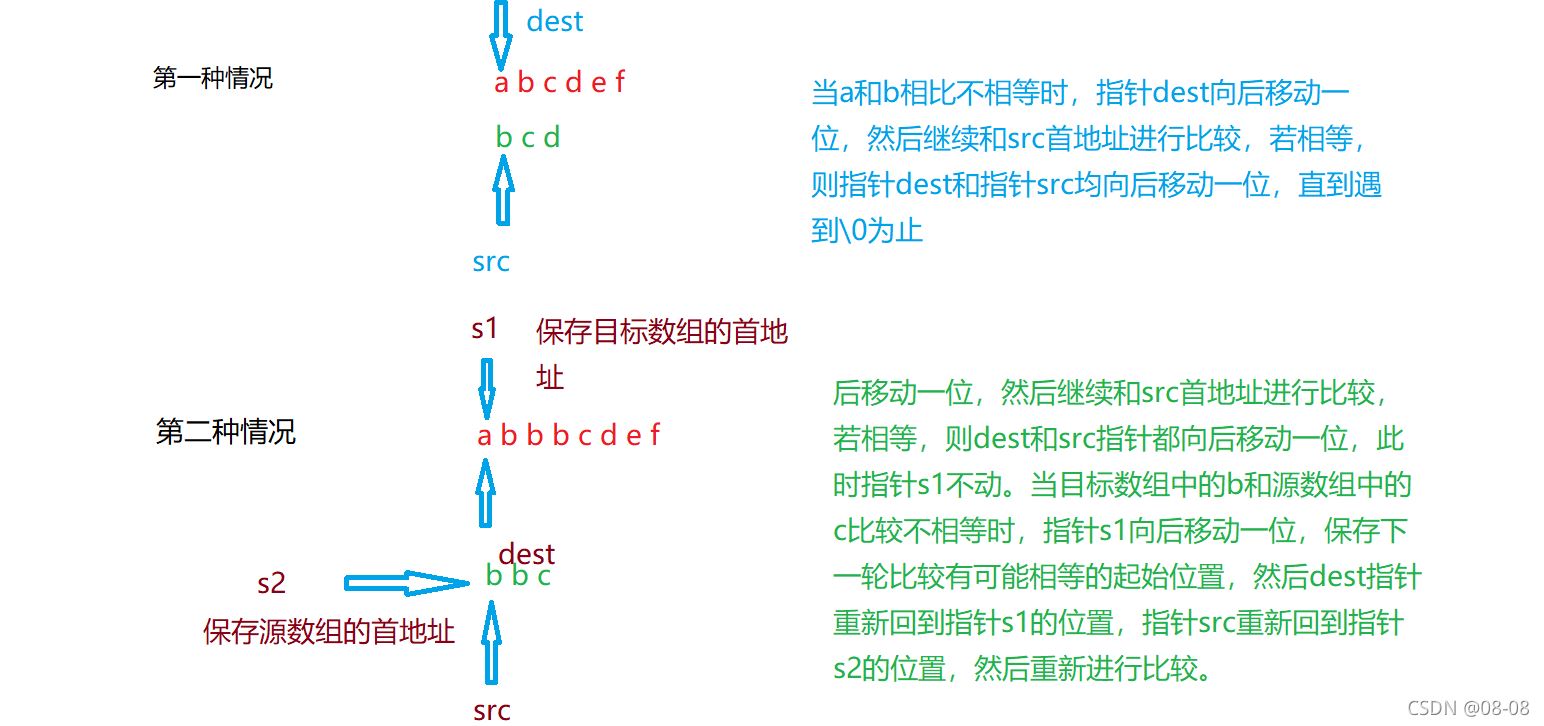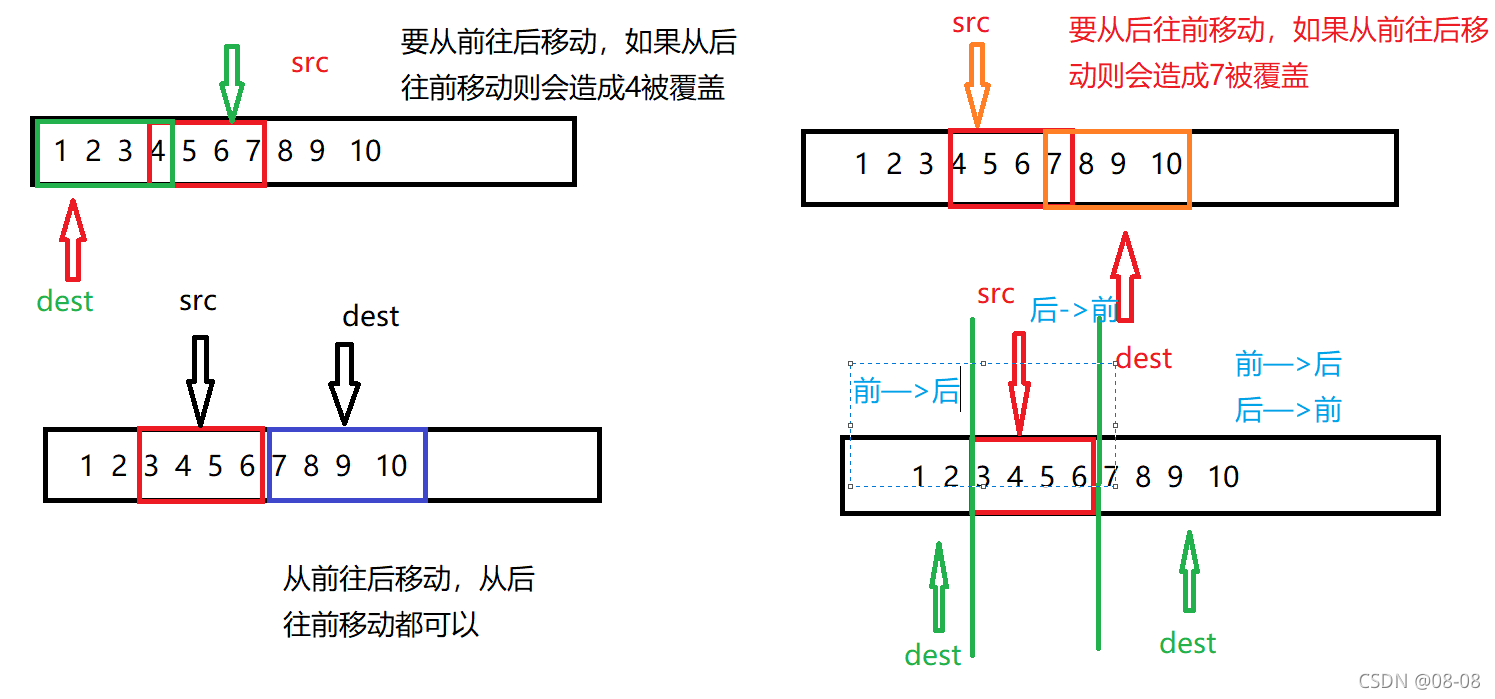一篇文章帶你實現C語言中常用庫函數的模擬
前言
C語言中對字符和字符串的處理很是頻繁,但是C語言本身是沒有字符串類型的,字符串通常放在常量字符串中或者字符數組中。 字符串常量適用於那些對它不做修改的字符串函數。
函數介紹
strlen(求字符串長度)
size_t strlen ( const char * str );
- 字符串已經’\0’作為結束標志,strlen函數返回的是在字符串中’\0’前面出現的字符個數(不包含’\0′)。
- 參數指向的字符串必須要以’\0’結束。
- 函數的返回值為size_t,是無符號的。
模擬實現:
#include<stdio.h>
size_t my_strlen(char* arr) {
int count = 0;
while (*arr) {
arr++;
count++;
}
return count;
}
int main() {
char arr[] = "abcdef";
size_t ret=my_strlen(arr);
printf("%u\n", ret);
return 0;
}
strcpy(字符串拷貝)
char* strcpy(char * destination, const char * source );
- 源字符串必須以’\0’結束。
- 會將源字符串中的’\0’拷貝到目標空間。
- 目標空間必須足夠大,以確保能存放源字符串。
- 目標空間必須可變。
模擬實現:
#include<stdio.h>
#include<assert.h>
char * my_strcpy(char* arr,const char* arr1) {
assert(arr && arr1);
char* ret = arr;
while (*arr++ = *arr1++) {
;
}
return ret;
}
int main() {
char arr[] = "xxxxxxxxxxxxxxx";
char arr1[] = "abcd";
my_strcpy(arr, arr1);
printf("%s\n", arr);
return 0;
}
strcat(字符串追加)
char * strcat ( char * destination, const char * source );
- 源字符串必須以’\0’結束。
- 目標空間必須足夠的大,能容納下源字符串的內容。
- 目標空間必須可修改。
模擬實現:
#include<stdio.h>
#include<assert.h>
char* my_strcat(char* dest, const char* src) {
assert(dest && src); //斷言-保護dest和src指針都不為空
char* ret = dest; //保存目標字符串的首地址
//找到目標字符串的末尾\0
while (*dest) {
dest++;
}
//把源字符串追加到目標字符串直到\0為止
while (*dest++ = *src++) {
;
}
return ret;
}
int main() {
char arr[20] = "abc";
char arr1[] = { 'd','e','f','\0' };
printf("%s\n", my_strcat(arr, arr1));//把arr1數組中的內容追加到arr數組中
return 0;
}
strcmp(字符串比較)
int strcmp ( const char * str1, const char * str2 );
- 第一個字符串大於第二個字符串,則返回大於0的數字。
- 第一個字符串等於第二個字符串,則返回0。
- 第一個字符串小於第二個字符串,則返回小於0的數字
模擬實現:
比較的是字符串的內容,不是字符串的長度
#include<stdio.h>
#include<assert.h>
int my_strcmp(const char* a, const char* b) {
assert(a && b);
while (*a == *b) {
if (*a == '\0')
return 0;
a++;
b++;
}
return *a - *b;
}
int main() {
char a[] = "abc";
char b[] = "abcq";
int ret=my_strcmp(a, b);
if (ret > 0)
printf(">\n");
else if (ret == 0)
printf("=\n");
else
printf("<\n");
return 0;
}
strstr(找子字符串)
char * strstr ( const char *, const char * );
- 在一個字符串中查找另一個字符串是否存在
- 查找源字符串在目標字符串中第一次出現的位置
模擬實現:
#include<stdio.h>
#include<assert.h>
char* my_strstr(const char* dest,const char* src) {
assert(dest && src);
char* s1=dest;
char* s2=src;
if (*src == '\0')
return dest;
while (*s1) {
dest = s1;
src = s2;
while (*dest!='\0'&&*src!='\0'&&*dest == *src) {
dest++;
src++;
}
if (*src == '\0')
return s1;
s1++;
}
return NULL;
}
int main() {
char arr[] = "I am a students";
char arr1[] = "am";
char *ret=my_strstr(arr, arr1);
if (ret == NULL)
printf("找不到");
else
printf("%s\n", ret);
return 0;
}
圖解:

memcpy(內存拷貝)
void * memcpy ( void * destination, const void * source, size_t num );
- 函數memcpy從source的位置開始向後復制num個字節的數據到destination的內存位置。
- 這個函數在遇到’\0’的時候並不會停下來。
- 如果source和destination有任何的重疊,復制的結果都是未定義的。
模擬實現:
#include<stdio.h>
#include<assert.h>
void* my_memcpy(void* dest, const void* src, size_t count) {
assert(dest && src);
void * ret = dest;
while (count--) {
*(char*)dest = *(char*)src;
dest=(char *)dest+1;
src=(char *)src+1;
}
return ret;
}
int main() {
int arr[10] = { 1,2,3,4,5,6,7,8,9,10 };
int arr1[20] = { 0 };
my_memcpy(arr1, arr, 10 * sizeof(int));
for (int i = 0; i < 20; i++) {
printf("%d ", arr1[i]);
}
printf("\n");
return 0;
}
memmove(內存移動)
void * memmove ( void * destination, const void * source, size_t num );
- 和memcpy的差別就是memmove函數處理的源內存塊和目標內存塊是可以重疊的。
- 如果源空間和目標空間出現重疊,就得使用memmove函數處理。
模擬實現:
#include<stdio.h>
#include<assert.h>
void* my_memmove(void* dest, const void* src, size_t count) {
assert(dest && src);
void* ret = dest;
//從前往後
if (dest < src) {
while (count--) {
*(char*)dest = *(char*)src;
dest = (char*)dest + 1;
src = (char*)src + 1;
}
}
//從後往前
else {
while (count--) {
*((char*)dest + count) = *((char*)src + count);
}
}
return ret;
}
int main() {
int arr[10] = { 1,2,3,4,5,6,7,8,9,10 };
my_memmove(arr + 2, arr, 16);
for (int i = 0; i < 10; i++) {
printf("%d ", arr[i]);
}
printf("\n");
return 0;
}
圖解:

總結
本篇文章就到這裡瞭,希望能夠給你帶來幫助,也希望您能夠多多關註WalkonNet的更多內容!